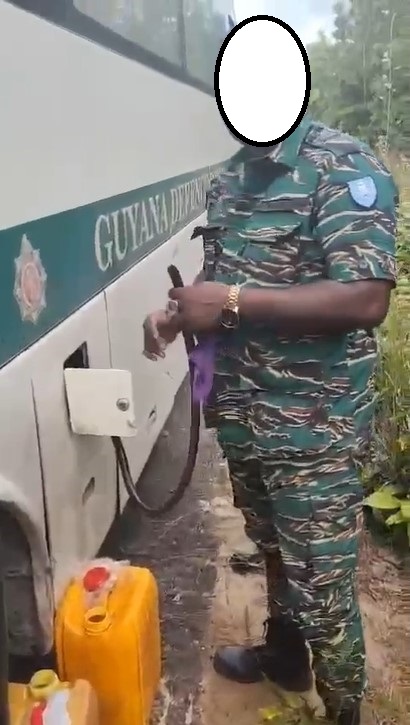In recent years, reports of financial misappropriation of government resources have raised alarm across various public institutions, and more recently, the alleged siphoning of fuel from a vehicle by a Guyana Defence Force (GDF) member. While such cases may initially appear as isolated acts of dishonesty, examining them through the lens of opportunity and motive reveals a more nuanced picture. For many in low-wage government positions, especially those who can be classified as “working poor,” the convergence of financial pressure and direct access to resources can create conditions where misappropriation feels like a viable, even necessary, solution to economic hardship.
Opportunity and Motive: The Theory Behind Financial Misappropriation
The theory of opportunity and motive suggests that theft often arises when three key conditions intersect: financial stress (motive), the means to access funds or resources (opportunity), and rationalization that justifies the act. Financial strain is a persistent reality for low-wage government workers in Guyana, with many earning barely enough to cover basic needs. The rising cost of living exacerbates this struggle, making these workers increasingly desperate.
The opportunity for misappropriation, meanwhile, is often embedded within the workplace. In Guyana, lower-level government employees frequently handle transactions, petty cash, and inventory control with limited oversight. This access, combined with minimal risk of immediate detection, opens the door for acts of misappropriation. The situation is compounded by inadequate internal controls and outdated or inefficient auditing systems, creating a landscape where financial misconduct may go unnoticed.
The Plight of Guyana’s Working Poor
Many of Guyana’s government employees live paycheck to paycheck, particularly in junior roles. Positions such as clerks, administrative assistants, and other support staff earn modest salaries, and limited job mobility means wage growth is slow or stagnant. With few options to supplement income, these workers may feel they have no choice but to “borrow” from available resources, even if they initially intend to replace what they take.
For some, using government resources for personal benefit can feel like compensation for the perceived injustice of their underpaid roles. Given the broader economic context, whether it’s the occasional use of office supplies, fuel, or small amounts of petty cash, these seemingly minor misappropriations may feel justifiable. However, in some cases, this initial “borrowing” can evolve into larger-scale embezzlement or unauthorized project expenditures, particularly if it appears no one is watching.
Examining the Cycle of Opportunity
The risk of undetected misappropriation is heightened in environments with weak accountability measures. In some cases, Guyanese government institutions may still rely on manual record-keeping and outdated asset management processes, creating loopholes for those inclined toward misuse. Lax auditing protocols, infrequent financial checks, and limited monitoring resources contribute to a permissive environment. This lack of rigorous oversight allows employees to take incremental liberties with government assets, potentially escalating over time as they grow more comfortable with the lack of repercussions.
In these cases, opportunity combines with financial desperation to create a cycle where misappropriation becomes normalized. Individuals may start with small acts, believing they can replace resources later, but as personal financial pressures mount, they may find themselves taking increasingly bold risks.
Addressing Root Causes to Combat Financial Misconduct
To reduce incidents of theft and misappropriation, it’s essential to look beyond punitive responses and address the structural and socio-economic drivers behind these behaviors. Tackling these root causes will require a multifaceted approach:
- Increased Wages and Financial Security: One of the most effective ways to reduce the motive for theft is to address low wages directly. Increasing salaries for government employees in low-wage positions would alleviate some of the economic pressure that fuels misappropriation. Guyana’s government could consider incremental wage adjustments or additional benefits to help the working poor avoid financial distress.
- Stronger Oversight and Auditing Mechanisms: Improving accountability and oversight in government departments is crucial. Implementing automated financial systems, conducting regular audits, and adopting digital record-keeping practices would reduce opportunities for unauthorized access and misuse of resources.
- Ethics and Integrity Training: Encouraging a culture of ethical behavior through workshops and training programs on financial integrity can have a long-term impact. By helping employees understand the broader effects of financial misconduct, they may be more inclined to uphold standards of integrity.
- Creating Safe Reporting Channels: Establishing anonymous and accessible reporting systems allows employees to report misconduct without fear of retaliation. This measure helps prevent small misappropriations from escalating, as whistleblowers can alert authorities to potential issues before they worsen.
The Path Forward: Addressing Systemic Inequities to Foster Integrity
As Guyana continues to grow and develop, addressing financial misconduct within government institutions will require a balance of preventive and corrective measures. The theft of government funds and resources cannot simply be seen as acts of individual wrongdoing; it reflects broader systemic issues, including wage inequality, insufficient oversight, and workplace dissatisfaction.
By improving employee compensation, implementing robust internal controls, and fostering a culture of transparency, Guyana can create a fairer and more equitable work environment. This holistic approach reduces financial misconduct and helps government employees feel valued, secure, and empowered to work ethically, knowing they are supported financially and professionally.






